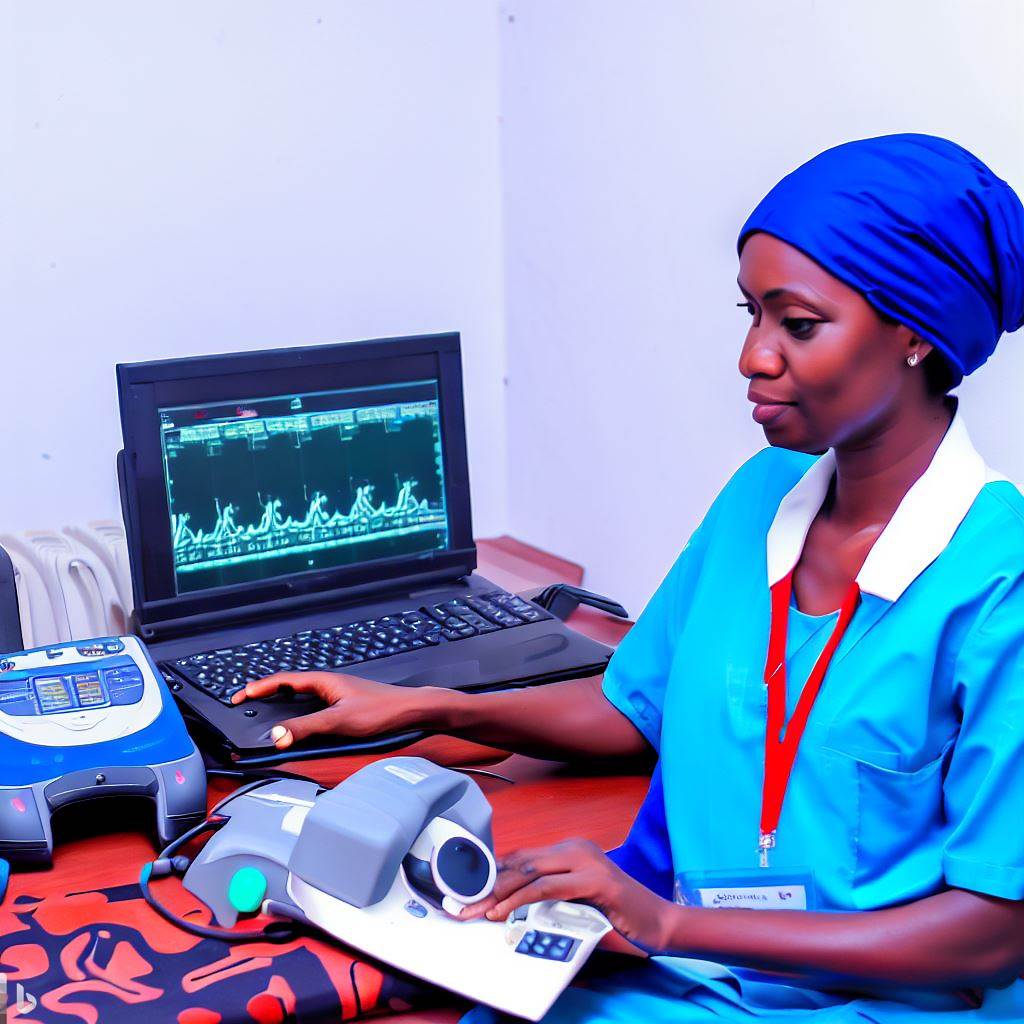Introduction
Clinical lab technicians are vital in Nigeria’s healthcare system. Discussing their job prospects is important for aspiring technicians and the healthcare industry.
This blog post will cover the current state of job opportunities and the future outlook for clinical lab technicians in Nigeria.
Overview of Clinical Lab Technicians in Nigeria
Role and Responsibilities of Clinical Lab Technicians
Clinical lab technicians perform various laboratory tests and procedures to assist in diagnosing and treating diseases.
They collect and analyze samples, such as blood, urine, and tissue, using sophisticated equipment.
Lab technicians are responsible for accurately recording and reporting test results to assist doctors in making sound medical decisions.
They may also perform maintenance and quality control tasks to ensure the accuracy and reliability of laboratory equipment and procedures.
This role requires attention to detail, excellent analytical skills, and adherence to strict laboratory protocols and safety measures.
Significant Contribution to Healthcare in Nigeria: Highlighting Their Impact
Clinical lab technicians play a crucial role in healthcare by providing essential diagnostic information to doctors and healthcare professionals.
Their accurate and timely test results help in the early detection and prevention of diseases, leading to improved patient outcomes.
Lab technicians contribute to the overall efficiency of healthcare facilities by assisting in the diagnosis and treatment of various medical conditions.
They also ensure the proper functioning of laboratory equipment, reducing the chances of errors and enhancing the reliability of test results.
Without the expertise and contribution of clinical lab technicians, the healthcare system in Nigeria would suffer from inadequate diagnostic capabilities.
Educational and Training Requirements to Become a Clinical Lab Technician in Nigeria
To become a clinical lab technician in Nigeria, one must have a minimum of a National Diploma (ND) in Medical Laboratory Science or related field.
Upon completion of the ND program, individuals are required to undergo a one-year internship in an accredited medical laboratory in Nigeria.
After the internship, aspiring lab technicians must pass the Medical Laboratory Science Council of Nigeria (MLSCN) licensing examination.
Transform Your Career in Nigeria
Discover unmatched expertise with our personalized Career Consulting service. Navigate Nigeria’s job market with a strategy tailored just for you.
Get StartedContinuing professional development is essential, and lab technicians are encouraged to engage in regular training programs and workshops.
Continuous learning ensures that clinical lab technicians stay updated with advances in technology and best practices in laboratory medicine.
Clinical lab technicians in Nigeria provide valuable support to the healthcare system. Their meticulous work and accurate test results aid in diagnosing and treating diseases effectively.
With the necessary education and training, individuals can pursue a rewarding career in this field.
Read: Understanding the Work Environment of Sonographers in Nigeria
Current Job Market for Clinical Lab Technicians in Nigeria
Overview of Current Demand for Clinical Lab Technicians in the Country
The demand for clinical lab technicians in Nigeria is currently high. The healthcare industry is expanding, leading to increased need for diagnostic services.
Medical facilities across the country require well-trained lab technicians to perform essential tests and analyses.
With a growing population and a rise in healthcare awareness, the demand for these professionals will continue to rise.
Clinical lab technicians play a vital role in disease diagnosis, patient care, and treatment planning.
Analysis of Job Market Trends and Growth Opportunities in the Field
The job market for clinical lab technicians in Nigeria has experienced significant growth in recent years. New and advanced diagnostics technologies are being introduced, creating more job opportunities.
The government’s focus on improving healthcare services has also contributed to the expansion of the sector.
As the industry evolves, the demand for lab technicians with specialized skills and knowledge will increase.
Continuous professional development and staying updated with the latest advancements are crucial for career growth.
There is a rising trend of private diagnostic laboratories, research centers, and clinics, providing additional employment options.
Highlighting Various Sectors Where Clinical Lab Technicians Can Find Employment
Hospitals and medical centers are the primary employers of clinical lab technicians in Nigeria. Public healthcare facilities, such as government hospitals and clinics, offer employment opportunities.
Private diagnostic laboratories and research centers provide career options for lab technicians.
Pharmaceutical companies and manufacturing industries often hire lab technicians for quality control and research purposes.
Universities and educational institutions employ lab technicians in their research departments.
The armed forces, including the military and police, also have the need for clinical lab technicians for medical services.
In the end, the job prospects for clinical lab technicians in Nigeria are promising. The current demand for these professionals is high due to the expanding healthcare industry and the need for diagnostic services.
Job market trends indicate growth opportunities as new technologies are introduced, and the government focuses on improving healthcare services.
Clinical lab technicians can find employment in various sectors, including hospitals, diagnostic laboratories, research centers, pharmaceutical companies, educational institutions, and the armed forces.
Continuous professional development and staying updated with advancements are essential for career growth in this field.
Read: Professional Associations for Lab Techs in Nigeria
Publish Your Professional Profile, Business or Brand
Showcase your expertise, gain trust, and boost visibility instantly on Professions.ng.
Publish NowChallenges Faced by Clinical Lab Technicians in Nigeria
Common challenges faced by clinical lab technicians in their job search
- Limited job opportunities due to low demand in the healthcare industry.
- Lack of specialized training programs leading to a shortage of qualified technicians.
- High competition among job seekers in the field of clinical lab technology.
- Inadequate awareness about the role and importance of lab technicians in healthcare.
- Difficulties in finding appropriate positions that match their skills and qualifications.
Impact of limited funding and resources on their work
- Insufficient funding for the procurement of advanced laboratory equipment and technology.
- Limited availability of necessary supplies, reagents, and consumables.
- Inadequate maintenance and repair of existing equipment due to financial constraints.
- Lack of access to updated scientific literature and research materials.
- Inadequate support for continuous professional development and training programs.
Issue of inadequate recognition and remuneration
- Lack of recognition from healthcare professionals and the public for their crucial role in patient care.
- Inadequate appreciation for the technical skills and knowledge they possess.
- Low salaries and limited opportunities for career advancement.
- Income disparities among different healthcare professionals, leading to demotivation.
- Lack of benefits and allowances commensurate with the responsibilities and risks involved in their job.
Clinical lab technicians in Nigeria face multiple challenges in their professional lives due to scarcity of job opportunities.
Job demand is low in healthcare, causing limited options. Specialized training programs are lacking, exacerbating the shortage of qualified technicians.
The field is highly competitive, making job-seeking difficult. Limited funding and resources impact equipment and technology procurement.
This affects work quality and efficiency. Necessary supplies, reagents, and consumables are often unavailable, impeding accurate results.
Maintenance and repair suffer due to financial constraints, leading to disruptions. Access to updated scientific literature and research materials is lacking, hindering professional growth.
Inadequate support for continuous professional development and training restricts skill enhancement. Inadequate recognition and remuneration add to challenges, affecting motivation and job satisfaction.
Lab technicians receive low salaries compared to counterparts in other healthcare professions. Limited opportunities for career advancement and income disparities discourage long-term careers.
Addressing these challenges is crucial to attract and retain skilled lab technicians, ensuring high-quality healthcare services in Nigeria.
Read: The Role of Lab Technicians in Nigeria’s Healthcare

Strategies for Improving Job Prospects
Enhancing Qualifications and Skills
- Obtain an advanced degree or certification to stand out in the competitive job market.
- Participate in workshops, seminars, and training programs to expand knowledge and skills.
- Join professional organizations to access resources and opportunities for career growth.
- Gain hands-on experience through internships, volunteer work, or part-time positions.
- Showcase strong communication, critical thinking, and problem-solving skills in applications and interviews.
Importance of Continuing Education and Professional Development
- Stay updated with the latest advancements in clinical laboratory technology through continuing education.
- Engage in professional development activities to broaden expertise and adapt to evolving industry trends.
- Demonstrate commitment to lifelong learning and improvement, which can impress potential employers.
- Attending conferences and webinars allows for networking and exposure to cutting-edge research.
- Continuous learning enhances job performance, increases employability, and opens doors to career progression.
Networking and Job Search Strategies
- Build a strong professional network by connecting with colleagues, mentors, and industry professionals.
- Attend career fairs, industry events, and job fairs to meet potential employers and explore opportunities.
- Utilize online platforms, such as LinkedIn, to create a compelling professional profile and expand connections.
- Engage in informational interviews to gain insights into the job market and make valuable contacts.
- Regularly search for job openings on professional websites, company portals, and social media platforms.
By implementing these strategies, clinical lab technicians in Nigeria can improve their job prospects significantly.
Read: The Future of Diagnostic Medical Sonography in Nigeria
Future Outlook for Clinical Lab Technicians in Nigeria
Potential growth and expansion of the healthcare industry in Nigeria
The healthcare industry in Nigeria has witnessed significant growth over the past decade. This growth can be attributed to the increasing population, urbanization, and improving economy.
The government has recognized the importance of healthcare and has invested in infrastructure and facilities. As a result, there has been a rise in the number of hospitals, clinics, and diagnostic centers.
This expansion has created a demand for skilled professionals, including clinical lab technicians.
Impact of technological advancements on clinical lab technician roles
Technological advancements have revolutionized the healthcare industry, including diagnostic testing.
Automated machines and advanced laboratory equipment have simplified and improved the accuracy of tests.
Clinical lab technicians now have access to sophisticated tools and software for data analysis. These advancements have made the role of clinical lab technicians more efficient and streamlined.
It has also increased the demand for technicians who are well-versed in using the latest technology.
Insights into the long-term career prospects for clinical lab technicians
With the growing healthcare industry and technological advancements, the future looks promising for clinical lab technicians.
The demand for skilled technicians is expected to continue rising, creating ample job opportunities.
As the population continues to grow, there will be a need for more healthcare facilities and diagnostic services.
Clinical lab technicians can expect to work in a variety of settings, including hospitals, research labs, and commercial labs.
With experience and further training, technicians can also advance to supervisory or managerial positions.
Continuous learning and staying updated with the latest advancements will be crucial for career growth.
The profession offers job stability and competitive salaries, making it an attractive option for individuals interested in healthcare.
Furthermore, the importance of diagnostic testing in healthcare decision-making ensures the continued demand for clinical lab technicians.
In essence, the future outlook for clinical lab technicians in Nigeria is promising. With the growth and expansion of the healthcare industry, there will be an increasing demand for skilled professionals.
Technological advancements have also enhanced the role of clinical lab technicians, making their work more efficient.
The long-term career prospects for technicians are favorable, with ample job opportunities and possibilities for advancement.
Overall, the field of clinical lab technology offers stability, competitive salaries, and opportunities for growth in Nigeria.
Conclusion
In summary, this blog post discussed the job prospects for clinical lab technicians in Nigeria. It reiterated the importance of these prospects, highlighting the demand for skilled professionals in the field.
It encourages readers to consider pursuing a career as a clinical lab technician in Nigeria, as there are potential opportunities available for growth and advancement.




